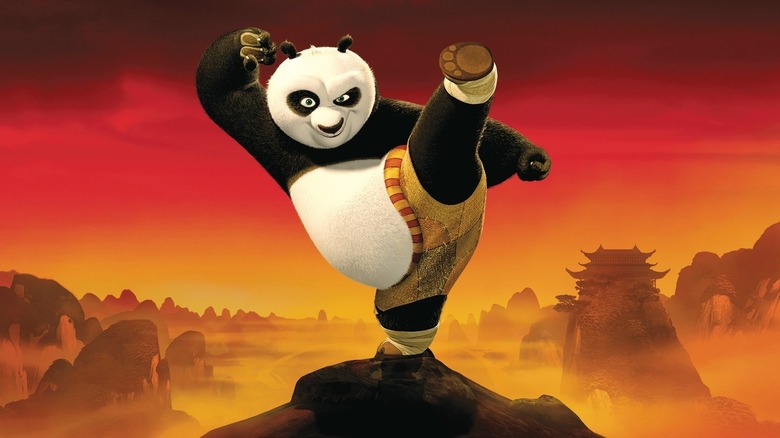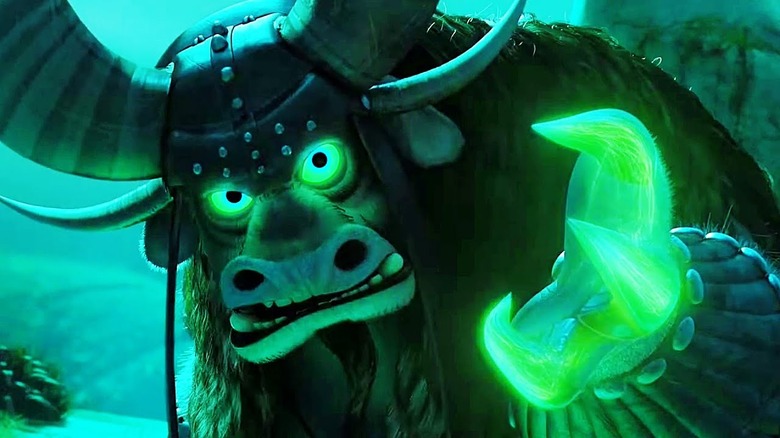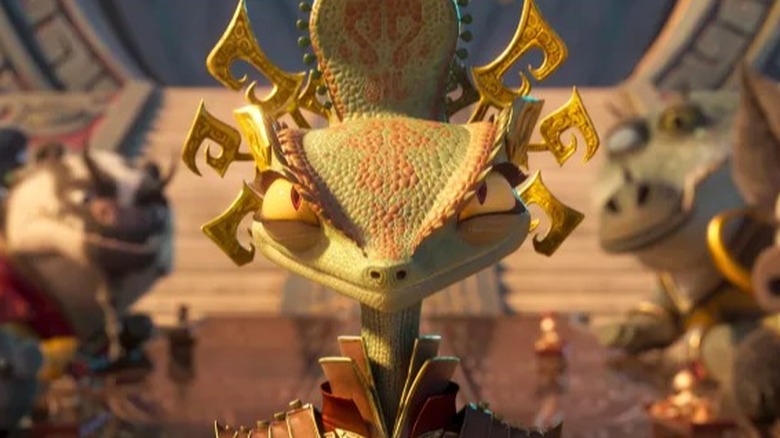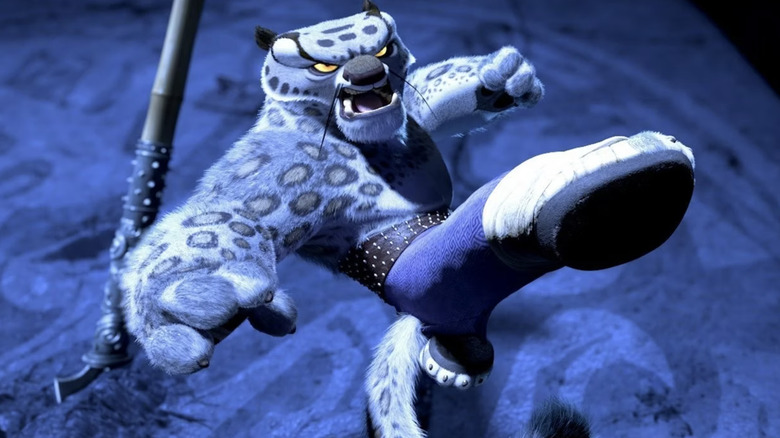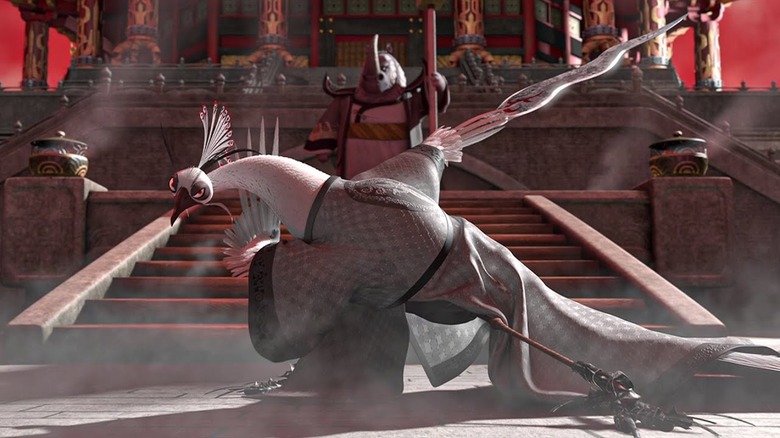Every Main Villain From The Kung Fu Panda Movies Ranked
In American animation, talking animal movies are a dime-a-dozen, but the "Kung Fu Panda" series is a gem. A big part of the appeal comes from the charming lead performance of Jack Black as Dragon Warrior Po (read /Film's interview with Black on the "Kung Fu Panda" circuit here). Another reason is the Wuxia-inspired action, where the bouncy CGI complements the characters' acrobatics and allows filmmakers to execute "Crouching Tiger, Hidden Dragon" style wire-fu with no need for actual wires.
Then there's the other secret ingredient: the villains. In each of the four films made so far (with the "Kung Fu Panda 4" box office making it likely another chapter won't be far behind), Po faces a new adversary, one with a new power he must overcome while also advancing on his own spiritual journey. Pretty typical hero's journey stuff, but like in martial arts, it's all about the proper execution.
I won't say the goal of kung fu is to win fights, but it definitely helps. If we pit the four "Kung Fu Panda" big bads against one another, which will fall on the bottom and come out on top? Let's dig in.
4. Kai (Kung Fu Panda 3)
"The Dark Knight Rises" upped its trilogy-closing stakes by introducing Bane (Tom Hardy), the most physically intimidating Batman foe. I couldn't help but think of this when watching "Kung Fu Panda 3" and its villain, Kai (J.K. Simmons). Kai is not only an enormous bull who dwarfs Po, he has powers that render Po's kung fu useless.
Kai controls chi, described in Chinese mythology as the energy of life. He not only wields it, but he can also steal it from others. He keeps his defeated foes as jade bobbles on his belt, ready to be released as "jade zombies" any time.
As a spirit from the ancient past, Kai is bound in chains like Jacob Marley, but he wields two jade colored blades on the ends of these chains. While his past with Master Oogway is established well-enough, Kai feels more like a mere obstacle to Po than an opponent or foil. His turn to evil lacks any deeper motive beyond greed, and his journey doesn't contrast Poe's in any meaningful way.
It's sadly ironic that all of Kai's humorous moments come from no one remembering him, when he's the least memorable of the "Kung Fu Panda" villains.
3. The Chameleon (Kung Fu Panda 4)
"Kung Fu Panda 4" is a movie about how people can (and must) change. So it only makes sens that the villain of the movie is the Chameleon (Viola Davis), a sorceress who takes her species' ability to change color into the realm of outright shapeshifting. A reptilian shapeshifting villain isn't a novel concept, thanks to the likes of Spider-Man villain the Chameleon, also a master of disguise, or Envy from "Fullmetal Alchemist" – like the latter, the Chameleon in "Kung Fu Panda" is literally green with envy.
The Chameleon's plot to steal kung fu powers from previous masters in the Spirit Realm feels too close to Kai's plan. However, her shapeshifting powers lead to one of the most inventive fights of Po's onscreen legend — particularly when she turns into dragon-like chimera (yet proves her stolen power still pales compared to the Dragon Warrior). Her role as Zhen's (Awkwafina) abusive adoptive mother figure also makes her a more fleshed out character than Kai. Still, it's telling that in the end, the Chameleon has to rely on villains from the previous movies to make the biggest impression possible.
2. Tai Lung (Kung Fu Panda)
Po's first opponent in "Kung Fu Panda" is the snow leopard Tai Lung (Ian McShane). Tai Lung has the best backstory, making him the most direct foil for the Dragon Warrior out of the series' villains.
Once the first student of Master Shifu (Dustin Hoffman), Po's eventual teacher, Tai Lung's ambition to be the Dragon Warrior turned his heart black. When denied what he felt was his (the Dragon Scroll), he snapped and was imprisoned. "Kung Fu Panda" builds up Tai Lung as an insurmountable threat. He makes a dramatic escape early in the first movie, defeating an army of rhinos and gravity itself to earn his freedom. Afterwards, he defeats the Furious Five with the help of his signature nerve strikes.
Tai Lung's reunion battle with Shifu will tug at your heartstrings, particularly how he can't accept his master's apology and continued pride in his kung fu mastery. Likewise, he can't grasp the message of the blank Dragon Scroll, "There is no secret ingredient," unlike Po, who channels his determination into external strength.
Shifu and Tai Lung's emotional shared backstory will resonate with both the children "Kung Fu Panda" was meant for and the parents who watch it with them. The writing shows how children's media can be smart and layered without losing sight of who it should be made for.
1. Lord Shen (Kung Fu Panda 2)
Don't underestimate peacocks (unless they're a streaming service). "Kung Fu Panda 2" is the best of the series and what tips the scale is its villain, Lord Shen (Gary Oldman). An albino peacock and heir to the throne of Gongmen City, Shen intends to use his family's secrets of rocketry and metallurgy to bring China to heel. Like many fantasy epics before and after it, "Kung Fu Panda 2" questions whether the human (er, animal) spirit can stand up when faced with weapons of industrialization.
Lord Shen has the best character design of the "Kung Fu Panda" villains. Accentuating the innate creepiness of a bird's face, Shen's beak shapes itself into a smirk and two black feathers extend from his face to form sinister eyebrows. His talons are adorned with metal plates, and he fights with knives concealed amongst his feathers; his fighting style reflects his animal traits.
To play Shen, Oldman draws on the evil mania he conjured as Norman Stansfield in "Léon The Professional," though this time with his native English accent, befitting of an aristocrat like Shen. The villain is charismatic but short-tempered, and he's often befuddled by Po's immaturity. Despite this comic relief, and Shen's moments of doubt combined with his parental issues, he's far too vile to be sympathetic. Faced with a prophecy that "a warrior of black and white" would defeat him, he committed panda genocide.
Lord Shen's fate is a cautionary tale about the dangers of letting the past define your future.
